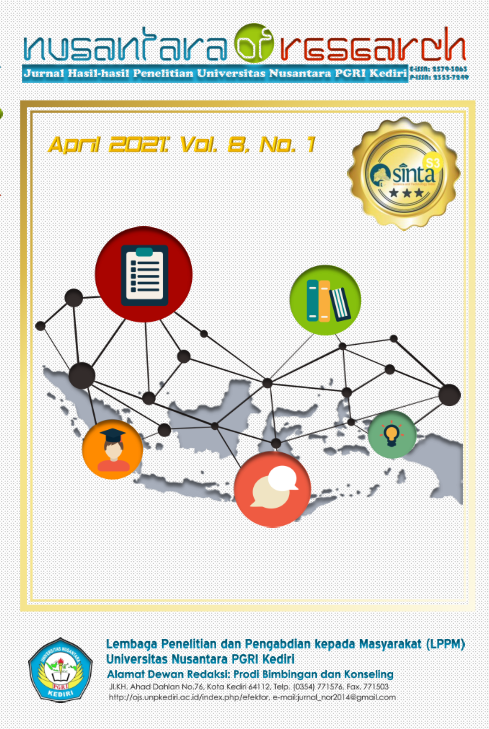Akeptabilitas Panduan Bimbingan Kelompok Untuk Meningkatkan Kemampuan Berpikir Kritis Siswa SMK
Isi Artikel Utama
Abstrak
Bimbingan kelompok menjadi salah satu setting layanan bimbingan dan konseling yang dilakukan oleh konselor pada siswa SMK. Bimbingan kelompok adalah bentuk layanan yang diberikan oleh konselor kepada konseli/siswa untuk menghasilkan keputusan dengan memanfaatkan dinamika kelompok. Dinamika kelompok yang terjadi selama bimbingan akan mendorong setiap anggota untuk berinteraksi. Dialog socrates merupakan teknik dialog secara mendalam untuk menelaah pikiran-pikiran yang muncul terhadap informasi yang diberikan dalam suatu proses interaksi. Penelitian ini bertujuan untuk mendeskripsikan akseptabilitas panduan bimbingan kelompok teknik dialog socrates dalam kerangka model problem based learning untuk meningkatkan kemampuan berpikir kritis siswa SMK. Teknik analisis panduan menggunakan analisis rater Aiken dengan uji oleh dua ahli bimbingan dan konseling. Hasil analisis berdasarkan uji ahli diperoleh indeks validitas aspek kejelasan sebesar 0,83 (tinggi) dan indeks validitas aspek ketepatan sebesar 0,83 (tinggi). Berdasarkan hasil pengujian maka dapat disimpulkan bahawa panduan telah memenuhi kriteria keberterimaan aspek kejelasan dan ketepatan untuk digunakan sebagai panduan bimbingan kelompok bagi siswa SMK.
##plugins.generic.usageStats.downloads##
Rincian Artikel
Authors who publish with this journal agree to the following terms:
- Copyright on any article is retained by the author(s).
- The author grants the journal, the right of first publication with the work simultaneously licensed under a Creative Commons Attribution License that allows others to share the work with an acknowledgment of the work’s authorship and initial publication in this journal.
- Authors are able to enter into separate, additional contractual arrangements for the non-exclusive distribution of the journal’s published version of the work (e.g., post it to an institutional repository or publish it in a book), with an acknowledgment of its initial publication in this journal.
- Authors are permitted and encouraged to post their work online (e.g., in institutional repositories or on their website) prior to and during the submission process, as it can lead to productive exchanges, as well as earlier and greater citation of published work.
- The article and any associated published material is distributed under the Creative Commons Attribution-ShareAlike 4.0 International License
Referensi
Borg, W. R., & Gall, M. D. (1983). Educational research: an introduction.London: Longman, Inc.
Bergstrom, C. M., Pugh, K. J., Phillips, M. M., & Machlev, M. (2016). Effects of problem-based learning on recognition learning and transfer accounting for GPA and goal orientation. The Journal of Experimental Education, 84(4), 764–786.
Chua, B. L., Tan, O. S., & Liu, W. C. (2016). Journey into the problem-solving process: cognitive functions in a PBL environment. Innovations in Education and Teaching International, 53(2), 191–202.
Dabbagh, N. (2019). Effects of PBL on critical thinking skills. The Wiley Handbook of Problem‐Based Learning, 135–156.
Hanggara, G. S. (2016). Keefektifan “proses guru” sebagai teknik bimbingan kelompok untuk meningkatkan kemampuan pengambilan keputusan karier siswa SMK. Jurnal Kajian Bimbingan Dan Konseling, 1(4), 148–157.
Nurhayati, N., Angraeni, L., & Wahyudi, W. (2019). Pengaruh Model Problem Based Learning, Kemampuan Berpikir Kritis terhadap Kemampuan Berpikir Tingkat Tinggi. EDUSAINS, 11(1), 12–20.
Nurtanto, M., Fawaid, M., & Sofyan, H. (2020). Problem Based Learning (PBL) in Industry 4.0: Improving Learning Quality through Character-Based Literacy Learning and Life Career Skill (LL-LCS). Journal of Physics: Conference Series, 1573(1), 12006.
Pitorini, D. E., Suciati, S., & Ariyanto, J. (2020). Kemampuan argumentasi siswa: Perbandingan model pembelajaran inkuiri terbimbing dan inkuiri terbimbing dipadu dialog Socrates. Jurnal Inovasi Pendidikan IPA, 6(1), 26–38.
Prabowo, A. S. (2020). PENGEMBANGAN BUKU PANDUAN PELAKSANAAN BIMBINGAN KELOMPOK DENGAN METODE DISKUSI UNTUK MENINGKATKAN MOTIVASI BELAJAR SISWA. Nathiqiyyah, 3(2), 41–52.
Saputra, A. T. (2016). Peningkatan Kemampuan Berpikir Kritis Menggunakan Model Problem Based Learning (PBL) pada Pembelajaran Tematik Terpadu di Sekolah Dasar. E-Journal Pembelajaran Inovasi, Jurnal Ilmiah Pendidikan Dasar, 1(1).
Sartika, M., & Yandri, H. (2019). Pengaruh layanan bimbingan kelompok terhadap konformitas teman sebaya. Indonesian Journal of Counseling and Development, 1(1), 9–17.
Shofiyah, N., & Wulandari, F. E. (2018). Model problem based learning (PBL) dalam melatih scientific reasoning siswa. Jurnal Penelitian Pendidikan IPA, 3(1), 33–38.
Supriyanto, A., & Wahyudi, A. (2018). Group Guidance Services Based on Folklore for Students Junior High School. International Journal of Indonesian Education and Teaching (IJIET), 2(1), 37–46.
Wulandari, A. P., Firman, F., & Solfema, S. (2020). Pengembangan Panduan Bimbingan Kelompok dalam Peningkatan Determinasi Diri (Self Determination) Untuk Pencegahan Agresivitas Siswa. Jurnal Imiah Pendidikan Dan Pembelajaran, 4(1), 175–184.
Wulansari, M. A. (2018). Pengembangan Buku Panduan Pencegahan Bahaya Narkoba Bagi Siswa Sekolah Menengah Pertama. Jurnal Bk UNESA, 8(1).
